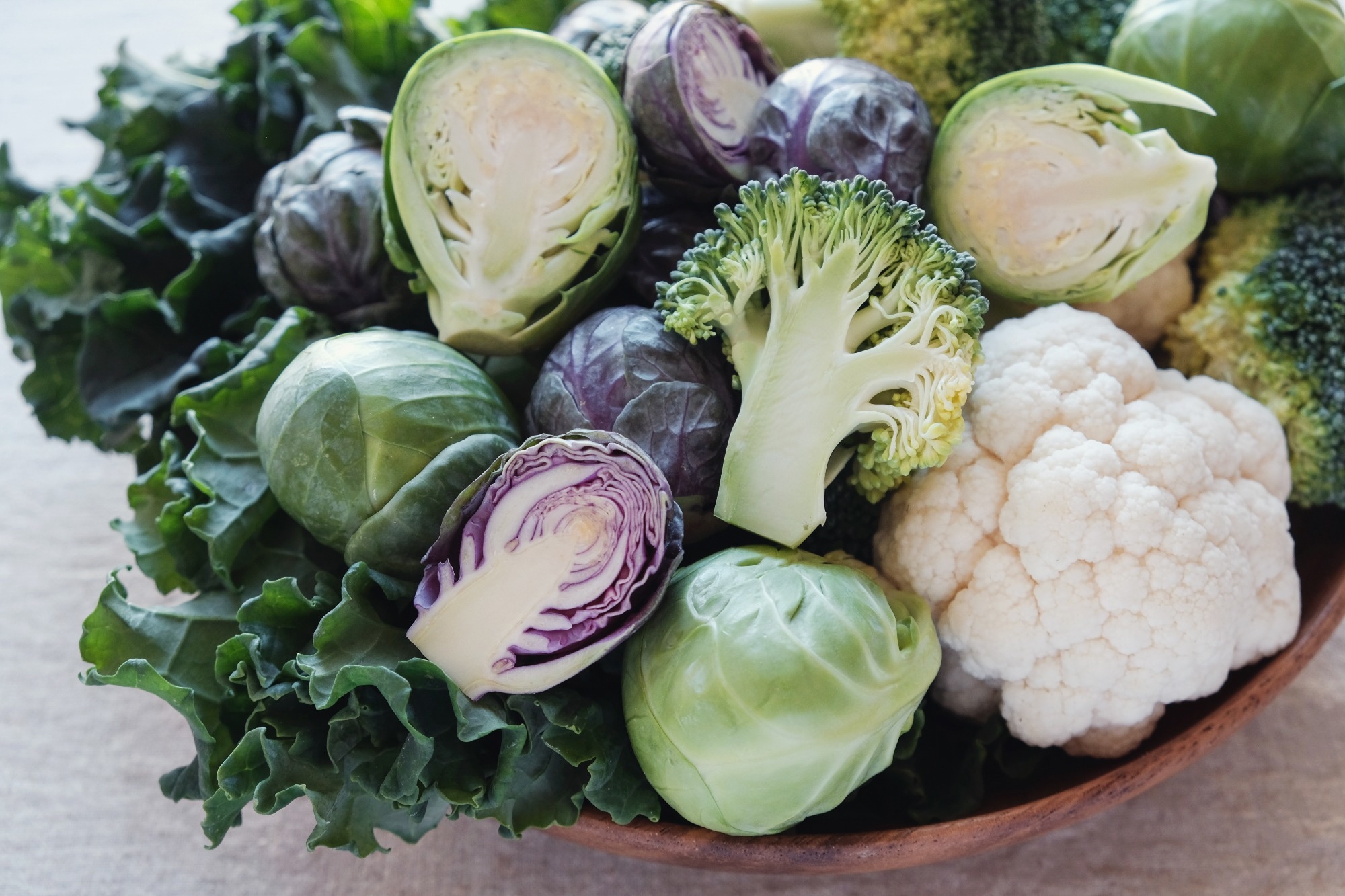In a recent review published in the journal Current Developments in Nutrition, researchers assessed the therapeutic potential of cruciferous vegetables and their bioactive compounds in managing inflammatory bowel disease (IBD) using in vitro, in vivo, and clinical models.
 Review: Current knowledge on the preparation and benefits of cruciferous vegetables as relates to in vitro, in vivo, and clinical models of Inflammatory Bowel Disease. Image Credit: SewCreamStudio / Shutterstock
Review: Current knowledge on the preparation and benefits of cruciferous vegetables as relates to in vitro, in vivo, and clinical models of Inflammatory Bowel Disease. Image Credit: SewCreamStudio / Shutterstock
Background
IBD, including Ulcerative Colitis (UC) and Crohn's Disease (CD), is a chronic condition characterized by persistent inflammation, gastrointestinal distress, and severe tissue damage. UC affects the colon and rectum, while CD involves the distal gut, both resulting in painful symptoms and the need for frequent surgical interventions. IBD's prevalence, particularly in Europe and North America, poses significant economic and social challenges, aggravated by links to modern lifestyle factors such as dietary changes to ultra-processed foods, urbanization, and stress. Current treatments, focusing on inflammation and microbial imbalances, often diminish in efficacy, highlighting the need for cost-effective management strategies and further research into personalized dietary interventions using bioactive compounds from cruciferous vegetables for improved therapeutic outcomes.
Introduction to cruciferous vegetables and bioactive compounds
Cruciferous vegetables belonging to the Brassicaceae family include a variety of nutrient-rich plants such as broccoli, Brussels sprouts, cabbage, and kale. These vegetables are distinguished by their high content of glucosinolates (GSLs), which are sulfur-containing compounds known to influence human health positively. When consumed, GSLs are converted by the enzyme myrosinase into isothiocyanates (ITCs) such as sulforaphane (SFN), compounds that have been extensively studied for their potential to modulate oxidative stress and inflammation- two key pathological aspects of IBD.
These vegetables also contain other significant bioactive compounds, such as flavonoids and polyphenols. Flavonoids, like quercetin and kaempferol, possess potent antioxidant properties that help scavenge harmful free radicals in the body. Polyphenols, including ferulic acid and sinapic acid, contribute further antioxidant and anti-inflammatory effects that are crucial for managing chronic diseases like IBD. The combined action of these compounds not only helps reduce oxidative stress and inflammation but also aids in strengthening the gut barrier and modulating the gut microbiome, thereby potentially alleviating symptoms of IBD.
In vitro evidence of cruciferous vegetable efficacy
Extensive in vitro research has underscored the therapeutic potential of cruciferous vegetables in the context of IBD. Studies using cell cultures have demonstrated that extracts from these vegetables can significantly inhibit the activation of key inflammatory pathways in immune cells. For instance, broccoli-derived nanoparticles have been shown to prevent the activation of dendritic cells and reduce the secretion of pro-inflammatory cytokines. These findings suggest that cruciferous vegetables can modulate immune responses, potentially lowering the incidence or severity of inflammatory processes within the gut.
Moreover, the anti-inflammatory effects are complemented by the vegetables' antioxidant properties. For example, studies on broccoli sprouts have highlighted their ability to increase the activity of phase II detoxifying enzymes, enhancing cellular defense mechanisms against oxidative damage. This is particularly important in IBD, where oxidative stress plays a critical role in aggravating intestinal inflammation and damage.
In vivo studies supporting cruciferous benefits
Animal studies have provided compelling evidence supporting the beneficial effects of cruciferous vegetables on IBD. Research utilizing different animal models of colitis has shown that diets enriched with cruciferous vegetables can reduce pathological scores and improve symptoms associated with IBD. These dietary interventions have been observed to modify gut microbiota composition favorably, increase the production of short-chain fatty acids, and enhance the intestinal barrier's integrity.
For instance, studies involving mice fed with SFN-rich broccoli extracts have reported reduced expression of inflammatory markers like Tumor Necrosis Factor (TNF)-alpha and Interleukin (IL)-6, along with an increase in the protective proteins of the gut barrier such as zonula occludens-1 (ZO-1). These findings indicate not only a reduction in inflammation but also an improvement in the structural components of the gut lining, which are often compromised in IBD patients.
Clinical insights and future research directions
Despite robust in vitro and in vivo evidence, clinical studies exploring the effects of cruciferous vegetables on human subjects with IBD are relatively limited. The existing studies highlight the critical role of vegetable preparation and the bioavailability of active compounds in determining their health benefits. For example, the effectiveness of SFN is influenced significantly by how broccoli is prepared and consumed, as cooking can destroy the enzyme myrosinase necessary for SFN's release.
Therefore, more clinical trials are needed to assess the impact of these vegetables on IBD comprehensively and to explore how these effects translate from laboratory and animal models to human health. Such studies should focus on various preparation methods, dosages, and consumption patterns to identify the most beneficial approaches for the dietary management of IBD.
Additionally, future research should aim to understand the individualized responses to cruciferous vegetable intake in different subpopulations of IBD patients. This could help tailor dietary recommendations to enhance individual patient outcomes and develop personalized nutritional therapies that are both effective and manageable over the long term.
Journal reference:
- TE Alaba, J.M. Holman, S.L. Ishaq, et al, Current knowledge on the preparation and benefits of cruciferous vegetables as relates to in vitro, in vivo, and clinical models of Inflammatory Bowel Disease., Current Developments in Nutrition, DOI - 10.1016/ j.cdnut.2024.102160, https://cdn.nutrition.org/article/S2475-2991(24)00094-5/fulltext